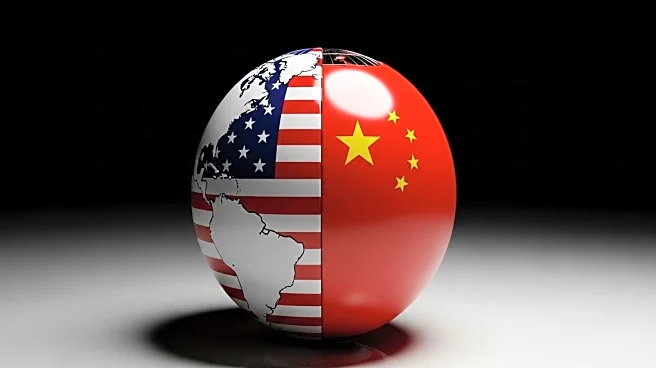What's Happening?
President Donald Trump announced a 100% tariff on all imports from China, escalating the trade conflict between the two nations. This decision follows China's tightening of export controls on rare earth minerals, which are crucial for the tech industry. China, the largest producer of these minerals, now requires foreign companies to apply for a license to export products containing them. Trump described China's actions as unprecedented and a moral disgrace in international trade. The tariffs, set to take effect on November 1, are in addition to existing tariffs on Chinese imports, which already have a base rate of 40%. Trump's announcement led to a significant drop in U.S. stock markets, with major indices like the Dow Jones, S&P 500, and Nasdaq experiencing declines.
Why It's Important?
The imposition of 100% tariffs by President Trump marks a significant escalation in the ongoing trade conflict between the United States and China. This move could have far-reaching implications for U.S. industries, particularly the tech sector, which relies heavily on rare earth minerals for manufacturing semiconductors and solar panels. The increased tariffs may lead to higher costs for U.S. companies and consumers, potentially affecting economic growth. Additionally, the stock market's negative reaction highlights investor concerns about the potential impact on corporate earnings and the broader economy. The situation underscores the fragile nature of international trade relations and the potential for further economic disruptions.
What's Next?
The tariffs are scheduled to take effect on November 1, but President Trump indicated that they could be reconsidered. He also mentioned that a planned meeting with Chinese President Xi Jinping might still occur, suggesting potential diplomatic efforts to resolve the conflict. Stakeholders, including political leaders and business executives, will likely monitor developments closely, as any changes in policy could significantly impact trade dynamics. The tech industry, in particular, may seek alternative sources for rare earth minerals or advocate for policy adjustments to mitigate the impact of the tariffs.
Beyond the Headlines
The trade conflict between the U.S. and China over rare earth minerals highlights broader geopolitical tensions and the strategic importance of these resources. Rare earth minerals are essential for various high-tech applications, and control over their supply can influence global technological advancements. The situation raises ethical and legal questions about the use of trade policies as tools for geopolitical leverage. Long-term shifts in supply chain strategies and international trade agreements may emerge as countries seek to secure access to critical resources.









